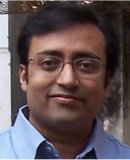|
Plenary Lecture
Role of Professional Antigen Presenting Cells in the
Genesis of Immune Response to Protein Therapeutics

Dr. Suryasarathi Dasgupta
Channing Laboratory, Brigham and Women's Hospital
Harvard Medical School
181 Longwood Avenue, Boston, MA 02135
USA
Also with: INSERM U872, Equipe 16, Paris, France
E-mail:
sdasgupta@rics.bwh.harvard.edu
Abstract:
Development of neutralizing
antibodies, is a crippling concern
in the management of patients
undergoing administration of
protein therapeutics as evidenced
in replacement therapy and other
treatment procedures. Several
issues in the genesis and
modulation of such deleterious
immune responses have been
studied. While authors have
focused on the downstream events
of the specific immune response
and suggested modification of
protein therapeutics to eliminate
epitopes that interact with B cell
receptors, T cell receptors, or
MHCII molecules, the mechanisms
underlying Ag interaction with
APCs, a step upstream of immune
effectors, have been grossly
neglected. We wish to emphasize
that the recent knowledge in
understanding the capacities of an
APC to handle an Ag and the
importance of the surrounding
microenvironment in this process
are crucial for designing novel
protein therapeutics with reduced
immunogenicity.
This talk would highlight the
increasing interest in
understanding the role of critical
cells in immune response – viz.
the Dendritic Cells and
Macrophages.
The scope of this knowledge is not
limited to issues concerning
immunogenicity.
Antigen presenting cells are
essentially "cellular sinks" for
an administered therapeutic. They
have profound role(s) in
catabolism of the therapeutic
protein.
This talk will thus try to
delineate the delicate balance
between half-life of a therapeutic
protein and its inherent
immunogenicity from the standpoint
of these cells.
This type of knowledge might be
essential in designing novel
protein therapeutic in the future.
Brief Biography of the Speaker:
I am a researcher in Biomedicine.
My broad interest is in how
cellular immunology and
biochemistry can be integrated to
understand therapeutic approaches
in a better way. I graduated from
the Indian Institute of
Technology-Bombay, Mumbai, India
with a PhD in Biosciences and
Bioengineering. I did postdoctoral
research in UMRS 872 Equipe 16,
INSERM, PARIS, France, wherein I
focussed to understand the genesis
of immune response against
therapeutic factor VIII in
hemophilia A patients with various
model systems. I co-authored
several peer-reviewed research
articles and review articles in
reputed international journals. I
presented my work in several
international conferences on
Immunology, Hematology and
Glycobiology. My work formed the
basis of various projects in our
laboratory and resulted in two
patents.
I was a member of the European
Macrophage and Dendritic cell
Society (EMDS) and have been
invited to review research and
review articles from several
journals viz. Arteriosclerosis,
Thrombosis and Vascular Biology &
Therapeutics and Clinical Risk
Management. I have won Young
investigator travel award from
several international societies
and companies which include EMDS,
International Congress of
Immunology and Tebu-Bio and
Novo-Nordisk. Currently I have
shifted to Boston where I am
working as an instructor at
Channing Laboratory, Department of
Medicine, Brigham and Women's
Hospital, Boston, MA. I am working
on understanding how components of
commensal microflora can induce
immunomodulation.
|